Arturo Mariano Iannace (IMT School for Advanced Studies Lucca)
Despite the sheer number of games with a medieval setting having been developed, only a few deal with internecine conflicts. This is due to the fact that this kind of conflicts (civil wars) assumes its proper distinctiveness only when put inside a specific political context.
In a typical RTS game, such as Age of Empires 2, players may fight against the same civilizations they are playing (e.g. Byzantines vs. Byzantines). But this fact has no tangible effect on the game. The fight takes place always in the same way. Campaigns and scenarios may take place in the midst of a civil war but, again, the conflict itself does not differ from a typical confrontation.
This is because, to model a civil war, a game has to model the political system that generated that war. Thus, only games with a strategic focus may achieve it.
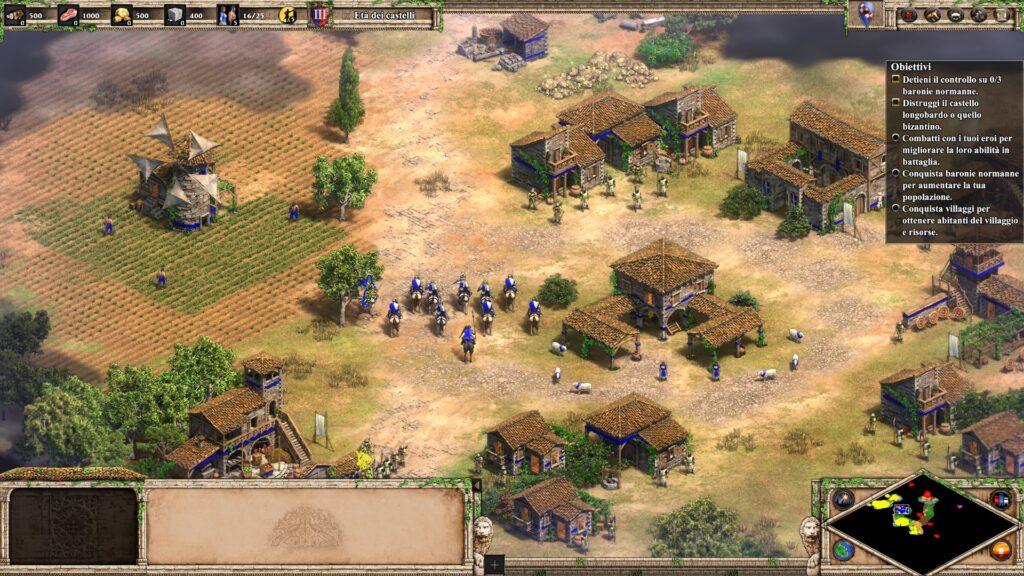
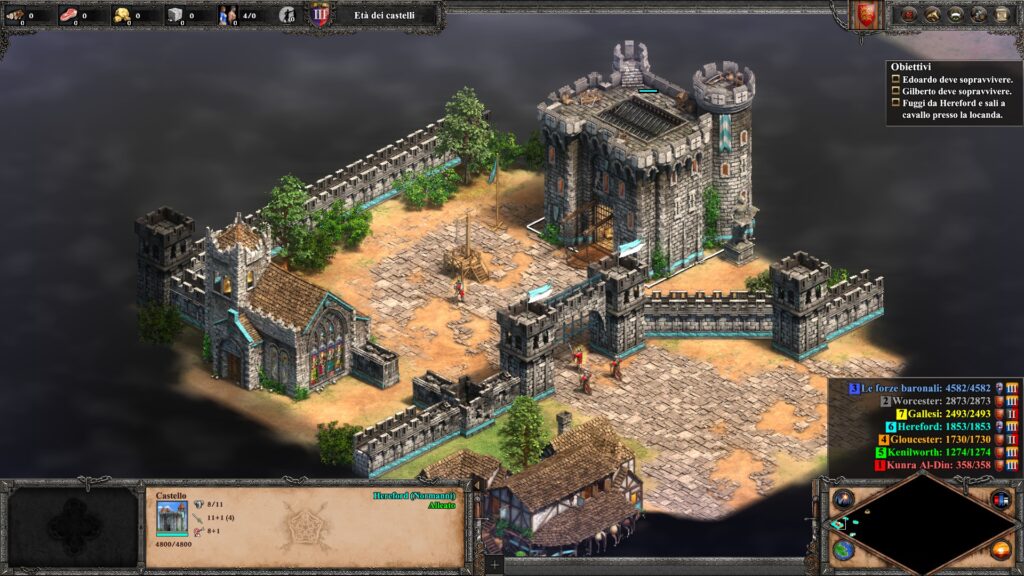
Among them, Crusader Kings 3, by Paradox Interactive, is probably the most significant exemplar currently available on the market.
In CK players find themselves immersed in a political system clearly drawing its features on the blueprint of ‘feudalism’. Here players have to deal with a rigid pyramid of feudal vassals made of barons, counts, dukes and, eventually, kings and emperors.
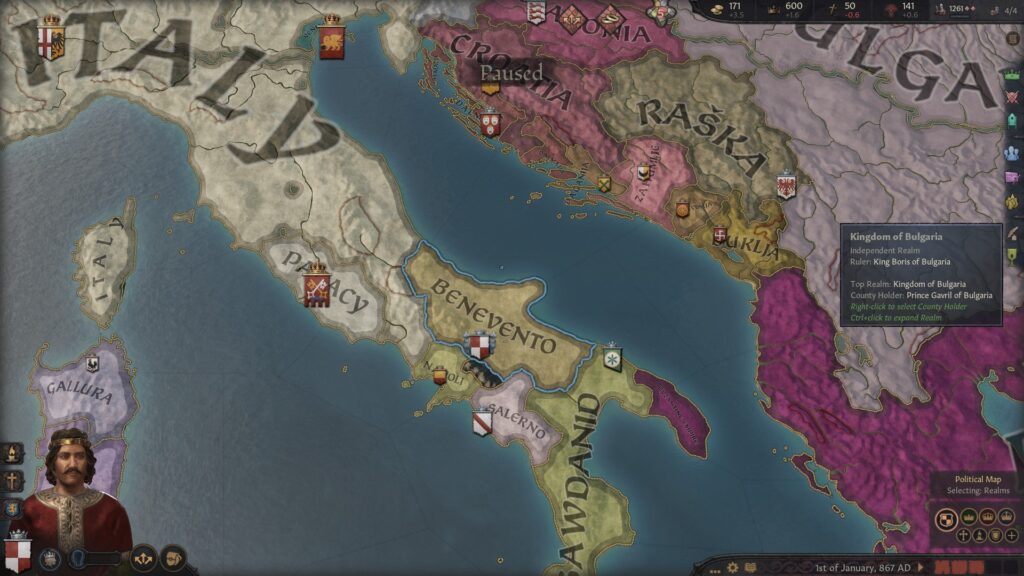
Internecine conflicts in CK always develop along the same lines. First, factions are formed. A faction is formed with a specific goal (e.g. lowering the Crown Authority; removing an undesired sovereign; and so on). Heads of factions will strive for attracting new members. To each member a power value is associated, and when the faction reaches or goes over 100% power, a countdown will begin for the moment in which the faction will formalize its grieviances and requests to the players, who then will have the choice between either to accept the ultimatum or to refuse it, thus going to war against the faction members.
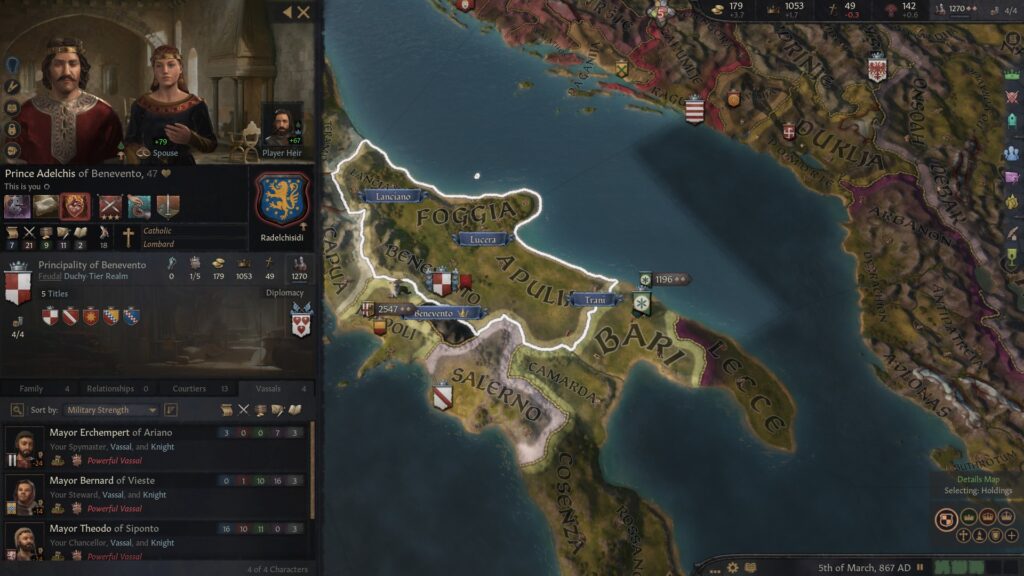
Each member has reasons for joining factions: grieviances over previous moves against them; traits or ambitions conflicting with those of the ruler; claims to titles owned by the ruler; and so on. A careful look at those reasons may give players the opportunity to weaken a growing faction by operating on the most powerful members, by addressing their grieviances, acknowledging their claims, or befriending them, for example (not to mention blackmailing and assassinations). If the war explodes, though, it will work exactly like a ‘normal’ military confrontation.
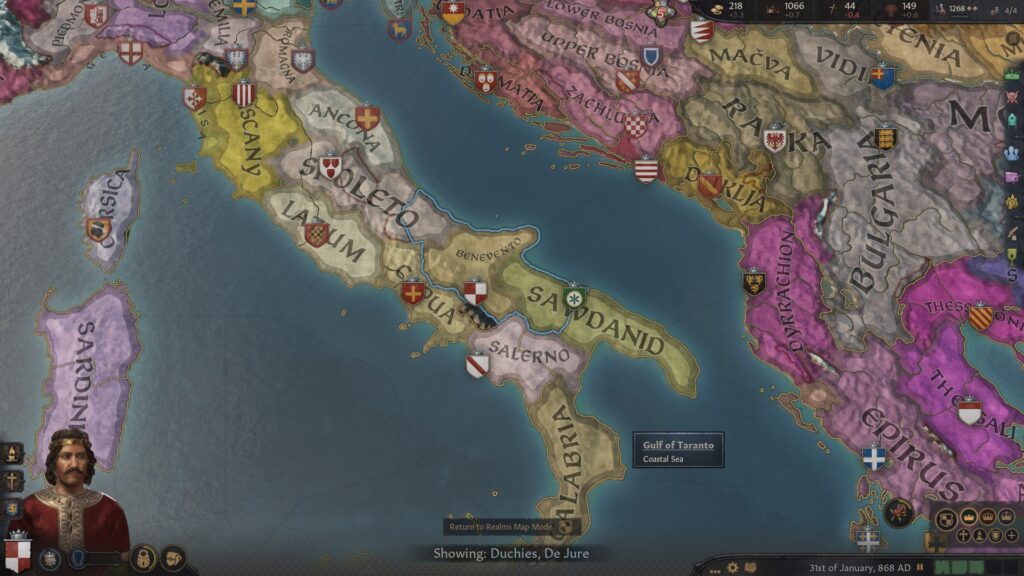
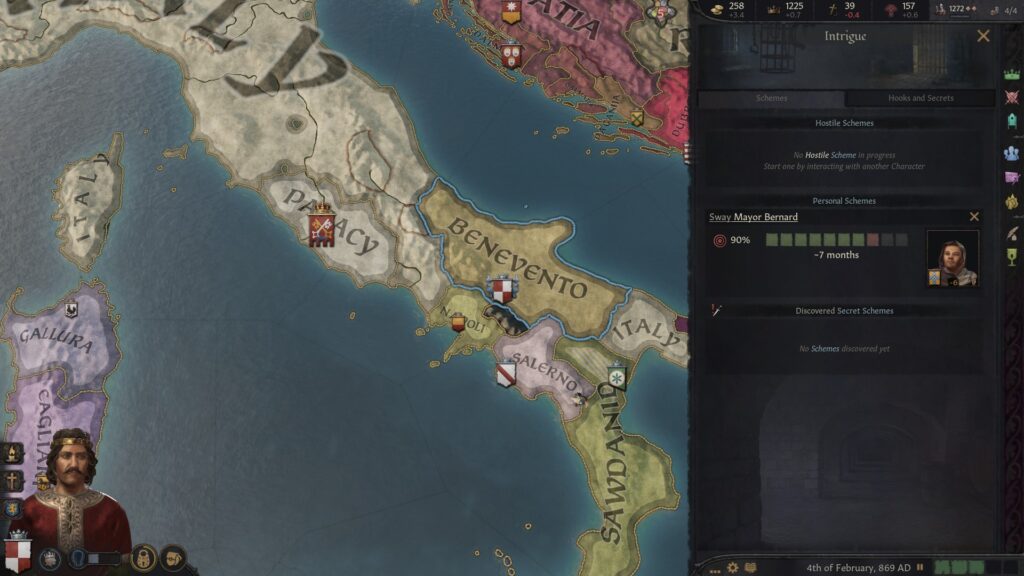
This system of faction and civil war is indipendent of the specific political context in which it operates. The workings are the same, whether players are impersonating the duke of Aquitaine, the king of England, or the sultan of Ghur. It also looks clear that the system identifies some peculiar elements of early medieval politics, namely the importance of personal relationships for positioning.
What it fails, however, to achieve is to really represent some other critical aspects of conflicts inside early medieval polities: the intertwining and overlapping of networks; the critical importance of land and honores; the fluid nature of factions during the confrontation; the structural role of clan- and family-based ties for faction-building and resilience; the part played, in some contexts, by cities as hubs for aristocratic power-building (officia) and maneuvering.
These issues would all emerge in the reproduction of specific events, such as, for example, the Beneventan civil war fought 839-849, when a contest for the Beneventan throne between two dynasties, and their aristocratic factions, resulted in the birth of a new principality (Salerno). Or, sticking with Beneventan history, the crisis which led to the unification of Benevento and Capua in 900 via a coup d’état.
However, despite these shortcomings, the game system does a remarkably good job in allowing players to explore early medieval civil war dynamics, perhaps even better compared to ‘genuinely feudal’ ones. With some tweaks and adjustments, CK could be easily used to teach about power structures and their conflicts inside early medieval polities, giving us valuable insights on how games could be effectively use for teaching, learning, and even exploring, historical political systems.
References:
- H. Lößlein, Royal Power in the Late Carolingian Age. Charles III the Simple and His Predecessors, Cologne, 2019
- S. MacLean, Kingship and Politics in the Late Ninth Century. Charles the Fat and the end of the Carolingian Empire, Cambridge, 2003
- C. Wickham, Early Medieval Italy: Central Power and Local Society, 400-1000, London & Basingstoke, 1981
- G. Zornetta, Italia meridionale longobarda, Roma, 2020
- T. David Mason, S. MacLaughlin Mitchell (eds.), What Do We Know About Civil Wars?, Lanham, 2023

Thank you so much for your presentation! I was wondering if you could tell us a bit about how you’ve been using the game or other games in the classroom? Do you have any top tips for us? Thanks! 😊
Thanks for your comment! 🙂 Admittedly, I didn’t have any opportunity yet for direct use of games in classroom (but I wish to underline the ‘yet’). Perhaps paradoxically, I think that, when dealing with classroom implementation, games such as Age of Empires could find a more fruitful use compared to Crusader Kings, simply because of the easier game systems: it is definitely harder to get into the basic concepts of CK than those of AoE (of course, mastering them is another thing though). Also, AoE is definitely easier to mod, so in theory it could be possible to create ad hoc scenarios for use.
However, one could imagine a multiplayer game of CK specifically devoted to the teaching of, for example, the mechanisms and dynamics behind the fragmentation of the Principality of Benevento, with sessions scheduled weekly (or two days a week), and the teacher playing the role of moderator. Discord, in particular, could well be used to coordinate such an effort.
Great ideas for integration! Another speaker was discussing that it is difficult to get the rights to use games in the classroom I’m assuming because of licenses, etc. What would be the way around this to use them educationally? Thanks!
Fantastic, Arturo! The mechanics around factions and civil wars have always been interesting, but it’s rather annoying in CK that there’s always an ultimatum and always this binary choice between caving to demands, and open war. Do you think there’s potential for more of a negotiation mini-game of some sort (or anything really) to be implemented here (and maybe also in the resolution of wars)?
Thank you for your question! It opens some intriguing venus for thought. I myself thought a little about the ultimatums (I totally agree with you that it is a bit annoying that it is always reduced to a binary choice, despite the choices players usually enjoy in the game). Of course, when dealing with these issues game balance must always be taken into proper account, but I definitely think there’s some potential for improvements. A negotiation mini-game of sorts, as you suggest, may be one of them. Or perhaps the introduction of mediation roles for other characters to get into the disputes, something that played a great relevance in the Middle Ages (but, I’d say, in conflict resolution in general).
Same goes for the resolution of the conflict itself, which is probably the most annoying part in CK in general, at least to me. Negotiation should play a role there, definitely.
I completely agree! It would be incredible to see more diplomatic options in general. (I do sometimes wonder if we as historians have completely unrealistic visions of what these games could look like, but ah well.)
Perhaps we do! But dreaming is always good.
I think there’s still much more to achieve in this field, so never say never.
Something interesting can be found in Hearts of Iron IV, where the mechanic of “decisions” allows you to trigger certain scripts if you achieve specific objectives. This way, you can avoid the total escalation of a situation. For example, the Mexican Civil War serves as a good example. Since both games are made by Paradox, perhaps a mod could be created to import a similar mechanic into Crusader Kings. CK3 already has something similar, but for other aspects.
I know HoI well, but I must say I never really liked their decision mechanics. I found it too ‘constraining’, particularly if compared with the usual freedom players are allowed to exercise in grand strategy games. Also, the effectiveness of the implementation comes to depend much on how large each tree is: compared to vanilla, for example, the Kaiserreich mod for HoI makes an amazing job in using it for really flashing out each country. Admittedly, hey also implemented it, though differently, in Europa Universalis 4 and Imperator: Rome, and perhaps they could do something similar to what they did in Imperator (which shares some similarities with CK).
Thank you for this, Arturo. Indeed, the implementation of civil wars is one thing that always bothered me in videogames.
Do you have any thoughts on internecine conflicts beyond strategy games? I know you said the genre has a particular affinity for it (which I agree). On the other hand, I wonder if a more ‘micro’ point of view wouldn’t be able to flesh out the contextual elements you mentioned. Not a historical example, but the November Reigns ending in Wasteland 3 strikes me as a possible benchmark for that sort of representation in RPGs. (For those who haven’t played the game: we can organize a coup on the local leader, rather than keep working for him like the game intended).
Also, shameless plug: my game, “The Triumphs of Turlough”, depicts a civil war. While it is a much simpler simulation than CK3 (by design), I like to think it did justice to at least some of the complexities you mentioned (“the intertwining and overlapping of networks; the critical importance of land and honores; the fluid nature of factions during the confrontation; the structural role of clan- and family-based ties”)
Thank you for your comment Vinicius! Actually, that’s one thing I’m thinking about since a while, as during the last year I began to see how RPGs may actually be even more useful than strategy games in order to model certain kinds of events.
Civil wars may indeed be one of them! Games such as Suzerain, and its latest DLC Kings of Rizia, do an amazing job, for example, in combining RPG with grand strategy elements, and I think this positively impact their effectiveness in helping the players identify important factors in the rising and explosiong of internecine conflicts.
Another amazing example (which I’m craving for exploring more in-depth, but lack of players hampered my efforts at the moment) is the Dune: Adventures in the Imperium TTRPG. While, of course, the setting is sci-fi, and while I do not concur with the political system in Dune being called ‘neo-medieval’ (since it clearly resembles more Modern Era feudalism), the game offers a combination of RPG and management/strategy options to players, so much that it could be easily conceived to use the ruleset for a campaign taking place, for example, in the Principality of Benevento to put players in front of the most important factors leading to the Beneventan civil war.